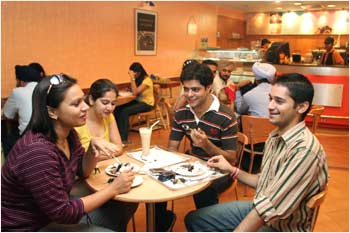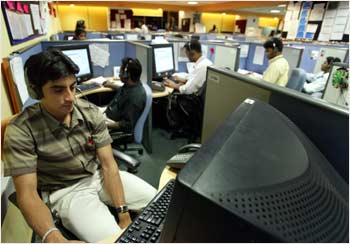Photographs: Ajay Verma/Reuters Ajit Balakrishnan
"All our competitors, the other relationship and matrimony sites, let you search and find partners by caste," said one.
"People always marry others of the same caste," said another. "Without caste information, how will they find an appropriate life partner?"
"Vikas, you are a Sikh who is married to a Maharashtrian," I pointed out to one of them. "Obviously, caste, nor mother tongue mattered to you, so why are you insisting that we have caste as a data point?" I pushed back.
"We are different, but 'they,' our users, want caste."
The irony of the discussion did not seem to have struck my young colleagues. Here we were, designing a consumer service on that most modern of tools, the Internet, and here were my young colleagues arguing that the users of this ultramodern service need to use caste as a factor in picking their marriage partner.
I could not help but think of that night many decades ago when our first prime minister, Jawaharlal Nehru had proclaimed that 'at the stroke of the midnight hour, when the world sleeps, India will awake to life and freedom when we step out from the old to the new, when an age ends... '
Had we really stepped out from the old to the new? Or, had we merely embraced the technology of the new and continued living in the old.
We also refract technology through our ancient social lens
Image: In a highly educated world, the girl child still faces a question mark on her existencePhotographs: Arko Dutta/Reuters
I quickly called a meeting of our New York team and asked them what this was all about and what we ought to do about this.
"All Indian-American papers carry such advertisements, so why not us?" said one.
"It is perfectly legal to provide such a service or advertise it in the United States," said another.
When I called Dr Sharma, the doctor in Detroit, who was the advertiser, he said the purpose of his ultrasound service was to give Indian-American couples 'the joy of finding out the sex of their child before it actually arrived in this world.'
"I would have thought that Indian Americans, considering that they are all so well-educated and live in a society with such liberal values would have left biases such as the one against a girl-child behind in India when they emigrated to America," I said.
"We have been running ads like this for years," pointed out our advertising department lady.
Again, I could not but think back to that speech at midnight.
'The past clings on to us still in some measure and we have to do much before we redeem the pledges we have so often taken. Yet the turning-point is past, and history begins anew for us...'
Or has it?
At least one of the meanings of the word 'celebrate' is to honour by performing a public rite, and in that sense almost all Indians honour technology, we eagerly spend our hard-earned money or borrow it to give our children a technological education; we clamour for more technical and scientific colleges to be established; we hold up Homi Bhabha and CV Raman as role models; we applaud our atomic tests and missile launches.
But we also refract technology through our ancient social lens and let the light that falls on the other side reflect ancient prejudices and insecurities.
Will we let technology deliver its true benefits?
Image: Then the outsourcing boom happened and it struck Indians that computers would be a source of jobsPhotographs: Sherwin Crasto/Reuters
Then the IT outsourcing boom happened and suddenly it struck Indians that computers would be a source of jobs and not a destroyer of jobs and all resistance melted. Today, when we happily book railway tickets online instead of waiting for hours in a queue at a railway station, the memory of these battles has faded.
Such battles are far from over. Biotechnology holds great promise as a way to make small farms that dominate the Indian agricultural landscape profitable, to find solutions for illnesses like diabetes, to add nutritional features to cereals like rice. Will we let technology deliver its true benefits or will we refract it through our ancient social lens?
It was Wiebe Bijker, the 'social constructionist' who pointed out scientific artifacts and practices such as what is embodied in the Internet, ultrasound or information technology are 'undetermined' by the natural world and that they are best seen as constructions of social groups. Because social groups have different interests and resources, how society puts a scientific artifact to use depends on the interplay of these interests.
Will we let technology finally deliver what Nehru hoped for that August 15th in 1947 when he proclaimed to the world our goal 'to bring freedom and opportunity to the common man, to the peasants and workers of India; to fight and end poverty and ignorance and disease [and] make all the people of India what destiny intended them to be?'
Ajit Balakrishnan is the founder and CEO of rediff.com. This article first appeared in 'Outlook' magazine.




article